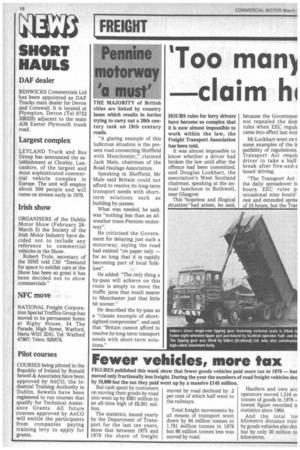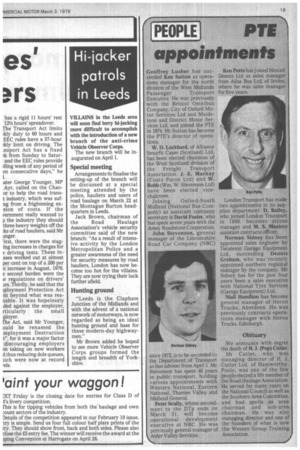`Too mans es' claim 111 ins
Page 20

Page 21

If you've noticed an error in this article please click here to report it so we can fix it.
HOURS rules for lorry drivers have become so complex that it is now almost impossible to work within the law, the Freight Transport Association has been told.
It was almost impossible to know whether a driver had broken the law until after the offence had been committed, said Douglas Lockhart, the association's West Scotland chairman, speaking at the annual luncheon in Bothwell, near Glasgow.
This "hopeless and illogical situation" had arisen, he said, because the Governmer not repealed the don rules when EEC reguli came into effect last mor Mr Lockhart went on t some examples of the it patibility of regulations. Transport Act requii driver to take a half. break after five-and-c hours' driving.
"The Transport Act the daily spreadover tc hours. EEC rules R occasional nine hours' rest and extended sprea of 15 hours, but the Trar has a rigid 11 hours' rest 121/2 hours' spreadover. The Transport Act limits !kly duty to 60 hours and EEC rules have a 57-hour limit on driving. The ,nsport Act has a fixed from Sunday to Satur • and the EEC rules provide dung week of any period of en consecutive days," he 1.
ater George Younger, MP Ayr, called on the Chan or to help the road transt industry, which was sufng from a frightening ex sion of costs. If the vernment really wanted to p the industry they should three heavy weights off the :ks of road hauliers, said Mr unger.
,irst, there were the staging increases in charges for v driving tests. These inases worked out at almost per cent on top of a 200 per it increase in August, 1976, e second burden were the kv regulations on drivers' ars. Thirdly, he said that the iployment Protection Act nt beyond what was reanable. It was hopelessly .ded against the employer, rticularly the small [ployer.
The Act, said Mr Younger, ould be renamed the ,mployment Destruction t", for it was a major factor discouraging employers om taking on new workers d thus reducing dole queues, iich were now at record rels.
































































































































































